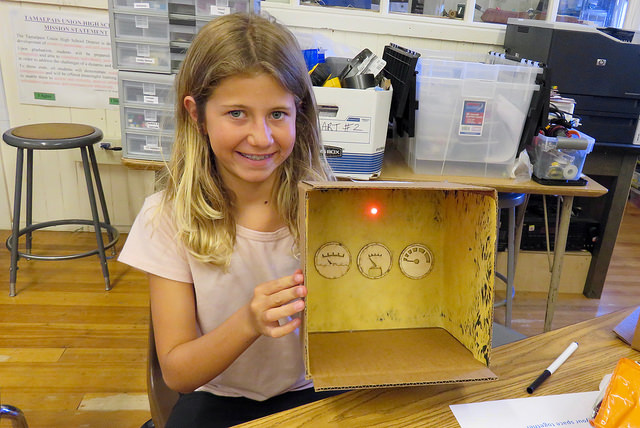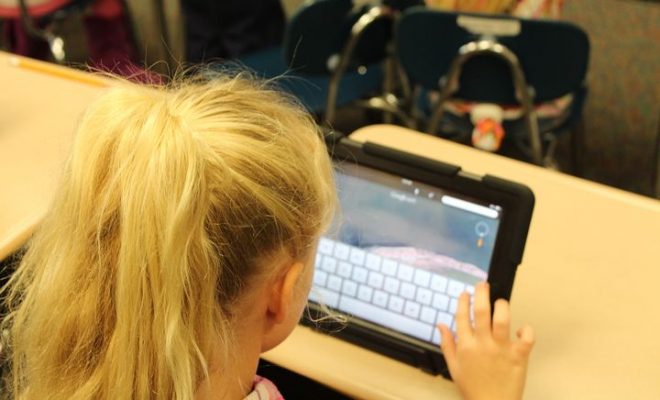The Dark Side of Educational Technology

There’s no denying that technology has great benefits for schools. However, any conversation that does not include the potential dangers of the widespread use of technology would not be complete. Here we will discuss the dark side of technology when it comes to its use in schools.
Tablets are a learning fixture in many K-12 classrooms these days. Teachers, administrators, and parents have all been on board to push for one-to-one tablet programs in classrooms throughout the country. Why? Because a tablet has the potential to provide quick access to information and personalized learning. While few schools have met the one-to-one goal yet, nearly 60 percent of administrators say they have implemented some form of mobile technology in classrooms.
The push reflects a global trend. Gartner research expected tablet sales to surpass laptop and desktop sales in 2015. Children have access to tablets and smartphones outside school grounds, making the technology in the classroom an easy adaptation. The difference, of course, is that instead of playing the latest version of Angry Birds or Candy Crush, students on tablets in the classroom can tap into the latest reading, math or history app. Administrators and teachers are also interested in the potential for so many other useful tools. Take digital textbooks, for example. Imagine a student with no back pain. Other applications include life skills tools, like calendars, to-do lists, and other time management applications.
Looking at surveys, it appears that the only reason administrators have NOT implemented the one-to-one tablet initiative is financial. The cost of the tablets themselves, along with maintenance costs, higher bandwidth and security features, and more manpower in school IT departments, are certainly obstacles. If money were no issue, though, it seems that most school districts would adapt this cultural push toward tablets as student rights.
It’s Always About Money…Except For When It’s Not
But is money the only sticking point when it comes to mobile technology in the classroom? Isn’t it just as possible that teachers and administrators, along with parents and kids, just got caught up in a commercial trend fueled by the companies that design and build tablets and smartphones? By the time classrooms reach a one-to-one point, will it be time already to upgrade to something else?
In a post titled “5 Problems with iPads in Education” digital CEO Mike Silagadze says that getting iPads, or other mobile devices, into classrooms is just the first step. What many school districts fail to consider when budgeting for the initial purchase is the cost of software, not to mention the teacher training that will be needed to make those devices effective. He points out that the current push for tablets in K-12 classrooms echoes the sentiments once reserved for in-class computers. In many cases, the learning promises associated with those computers did not come to fruition, he says, leaving behind a wake of technology-jaded educators. He says:
“We need to be careful to introduce technology in thoughtful ways or else we will be left with another generation of teachers who see technology as nothing but overpriced distractions rather than useful teaching tools.”
He raises a good point, though. Can the potential of mobile technology in classrooms ever live up to the hype surrounding it? Sure, the convenience and ability for student self-direction are benefits, but these can also send the wrong message to the next generation. Learning does not always have to have a “fun” portion attached. Sometimes it is just challenging, but the payoff is greater. Students that learn to read electronically and to find books at the touch of a button will never know the joy of tracking down a library book, via Dewey Decimal System. The instant gratification tablets in education provide make accessing knowledge easier – but does that make it better?
As more schools get closer to reaching one-to-one tablet goals, more than just budget constraints need to be addressed. Questions of work ethics and the value of traditional, non-digital learning methods need to be asked too.
Let’s look a little deeper into the idea of using technology right. This concept applies even on a global scale.
Around the world, 6.5 million mobile device contracts exist — making tools like smartphones and tablets an indispensable and necessary part of life. How can this technological shift benefit students in classrooms, though? That seems to always be the subject of debate, with some people claiming more technology for K-12 kids is needed and now, while others say that learning is being sacrificed for the sake of flashy technology.
At the Education Fast Forward event, education and technology leaders debated the best ways to use classroom technology across the globe, to help it reach areas that do not yet have it in place. The focus was on how to improve digital technology.
Success stories were part of the discussions. Professor Miguel Nussbaum of Pontificia Universidad Catolica de Chile was among the speakers, and he talked about how his developments are leading to better integration of technology in classrooms in India, the U.K. and the U.S.
In talking about his research with the Huffington Post, Nussbaum said that while Chile has tried to implement its practices when it comes to teaching and technology, his ideas are more integrated with the actual material.
“The main problem is that government lead projects have been targeted to introduce technology without considering the pedagogical practices that are associated to produce learning,” he said.
Though he is talking about his home country, I think his point is well received here in the U.S. too. While I applaud the government’s involvement in ensuring that technology learning and equipment is reaching classrooms, I do think that some of the responsibility should be given to educators themselves and even private entities that can bring in greater levels of innovation for students.
Does the Widespread Use of Technology Leave Some Students Behind?
Technology can be a great equalizer for students while they are in school, as all students have the same access to classroom resources. But what happens when the students go home?
Even today, some students do not have Internet access at home.
One example of this challenge is playing out in Madison, Wisconsin. A Tableau survey of over 27,000 students found that around 12 percent of students in the Madison Metropolis School District do not have access to the Internet.
Of the elementary through high school students surveyed, 97 percent of white students and 93 percent of Asian students have access to the Internet – but only 74 percent of African-American students and 79 percent of Hispanic students have access.
Similarly, only 78 percent of low-income students have access to the Internet, compared with 98 percent of students that did not fall into the low-income category.
The district is hoping to improve the equity of access for all students.
I think it’s really important to remember that not all students are fortunate enough to have access to the Internet. Providing technology devices is a great start, and I think it’s terrific that Madison Metropolis School District can do this for its students. However, if not everyone can get online from home, it hinders the potential good of the devices.
It sounds like Madison needs to make sure students without Internet access at home can find locations to take advantage of their devices, such as ensuring the school campus has open Wi-Fi. I hope that we can find ways to overcome the issue in Madison and other school districts out there facing the same challenges to keep minority and low-income students from falling further behind their peers.
Can Technology Magnify Your Problems as an Educator? Yes, Yes, and Yes.
Some actions are bad enough as is. Cheating is one of those things.
Imagine how much easier it can be to cheat with the increasing use of technology.
Academic dishonesty is nothing new. As long as there have been homework assignments and tests, there have been cheaters. The way that cheating looks have changed over time, though, particularly now that technology has made it easier than ever.
And perhaps the most interesting caveat of modern-day cheating in U.S. classrooms is that students often do not think that what they are doing is wrong.
A study by the Josephson Institute of Ethics interviewed 23,000 high school students and asked them a variety of questions about academic ethics. Of the teens surveyed, 51 percent said that they had knowingly cheated at some point on an exam but that they had no qualms about the behavior. A Common Sense Media survey found that 35 percent of students had cheated via cell phone, though the parents surveyed in that particular study did not believe their kids had ever cheated. In many cases, students did not realize that tactics like looking up answers on a smartphone were cheating at all.
In today’s K-12 classrooms, students who cheat are rarely caught. There are no formulas written on in the insides of hands or students looking across the aisle, or whispering answers to their classmates. Today’s students use smartphones, tablets or even in-class computers to aid their cheating endeavors and leave no trace of their crimes. Since cheating through technology is not listed specifically as being against the rules in many school policies, students do not view the actions an unethical.
Consider the following ways that technology aids in modern-day academic dishonesty:
- Storing notes on a cell phone.
• Purchasing prewritten papers online, or ordering them to be customized.
• Writing a paper that is the same as something else found online, but changed enough to look original.
• Students text messaging each other answers.
• Using a smartphone camera to take a picture of a test or exam.
• Using voice recorders or virtual assistance programs to record or ask for answers.
Most of the tactics on this list were non-existent ten years ago, or at least the technology was not in common use by young people. A Pew Internet survey found that 78 percent of teenagers have mobile phones, up from just 23 percent in 2011. The technology is being adopted so quickly that school districts cannot adequately keep up with cheating policies, or even awareness campaigns that alert students to the problem with using technology to find answers in a certain way.
From a young age, students learn that answers exist at their fingertips through search engines and expert websites. It is more efficient to just look up the answers through the hard work someone else has already done than to find the answers on their own.
K-12 students are not the only culprits, though. When was the last time you went to the library or dug through physical records or documentation to find the answer to something? Adults take advantage of the convenience of technology all the time – even in the workplace. The difference, of course, is that most adults grew up at least partially technology-free. Today’s students will not have that life experience and instead will have learned the quickest ways to find answers – not necessarily the right ones.
Schools must develop anti-cheating policies that include technology, and those policies must be updated consistently. Teachers must stay vigilant when it comes to what their students are doing in classrooms and how technology could be playing a negative role in the learning process. Parents must also talk to their kids about the appropriate ways to find academic answers and alert them to unethical behaviors that may seem innocent in their own eyes.
Technology is an Experience
For better or worse, technology is not just about exciting new gadgets and apps. Each major new development leads to new experiences and unchartered territory. Often the results of using these technologies will be unexpected in both good and bad ways. As an educator, you need to be forward-thinking and adaptable to prepare for anything that comes your way. Be creative in how you can use classroom technologies to become better educators and think of ways to minimize its negative effects. It is not an easy feat, but I believe it is one worth pursuing.





